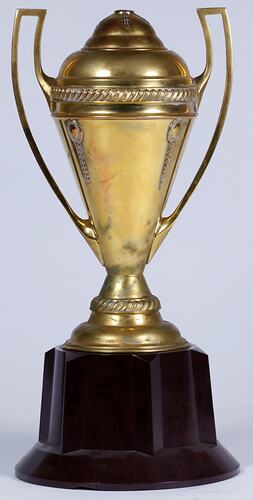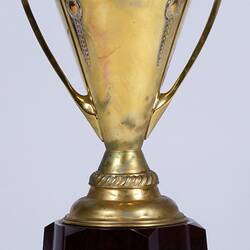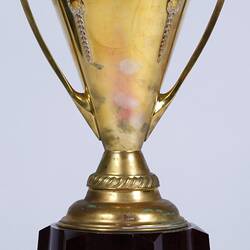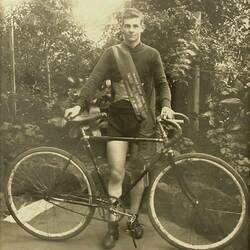Summary
The Bol d'Or was a classic French cycling race (named for its trophy), held on the Buffalo velodrome in Paris. Each competitor was paced by three riders on a triple tandem bicycle. The racer followed closely, using the pacers as a windbreak, while attempting to cover the most distance (by laps of the velodrome track) over the 24 hour period.
Opperman covered 593.8 miles (950.06 kilometres) and bettered the world's competition record set by Oscar Egg, four years previously, by 8.6 miles. He also continued riding to set a new world record for 1000 kilometres (approximately 625 miles) in 25 hours, 19 minutes and 36 seconds. The event was not without its mishaps - Opperman punctured three times, broke his chain twice, and suffered from loose handlebars. At one point he swapped to a road bicycle, despite its inefficiency for track racing, while his track bicycle was being fixed. With cheering crowds he raced to catch up to his remaining competitors and to victory and a new world record.
Opperman's achievement was very well received by the French spectators who admired his racing style, courage and tenacity. After the event, he was carried on shoulders from the track to loud cheers. French newspaper reports declared him the greatest all-round cyclist in the world and that his victory had been the greatest sporting achievement that the French public had witnessed for a long time. The readers of the most popular French sporting newspaper, L'Auto also voted him the most popular athlete of the year.
After the race Opperman sent the following cable to Australia:" WON BOL D'OR. BROKE OSCAR EGGS RECORD. ALSO WORLD'S 1000 KILOMETRE RECORD. MALVERN STAR GREATEST BICYCLE IN WORLD. - OPPY."
Physical Description
Metal trophy on a hollow Bakelite stand. Trophy is gold plated over an alloy of copper, zinc and nickel. Cone shaped with domed lid and two oblong handles, with rosette decorations on either side of handles.
More Information
-
Collection Names
-
Collecting Areas
-
Acquisition Information
Cultural Gifts Donation from Sir Hubert Opperman, Jun 1979
-
Acknowledgement
Donated under the Australian Government's Cultural Gifts Program by Sir Hubert Opperman.
-
Awarded To
-
Place & Date of Event
-
Inscriptions
Makers mark on base with 'EPNS' (electroplated nickel silver) underneath. Sticker under Bakerlite stand: 160
-
Classification
-
Category
-
Discipline
-
Type of item
-
Object Dimensions
398 mm (Height), 195 mm (Outside Diameter), 1.3 kg (Weight)
-
References
'Cycling in France' The Advertiser (Adelaide, SA : 1889 - 1931), Tuesday 4 September 1928, page 16 'Opperman at Fremantle' The West Australian (Perth, WA : 1879 - 1954), Thursday 22 November 1928, page 15
-
Keywords



